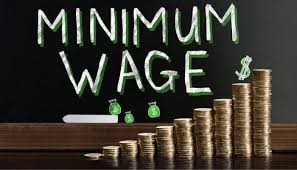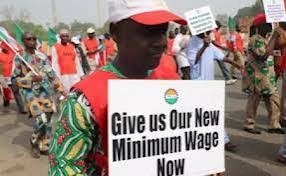In honor of May Day, an occasion celebrating workers’ rights and contributions, the Nigerian government has announced a significant salary increase for select categories of workers across the country. This move reflects a commitment to enhancing the livelihoods of workers and addressing longstanding concerns regarding wage adequacy in light of economic realities.
The government has approved compensation increases of 25 percent and 35 percent for specific personnel groups, effective immediately. This policy seeks to raise workers’ standards of living in the face of economic hardship by easing their financial burdens.
It is notable that since 2019, Nigeria’s minimum wage has remained at 30,000 naira per month. However, due to the depreciation of the national currency, the actual value of this wage has been progressively declining and is currently less than $20. Workers are under excessive strain due to this depreciation, which makes it harder for them to support their families and meet basic needs.
Labor unions have been vocal in their advocacy for a wage adjustment, arguing that the current minimum wage falls short of ensuring the well-being of the average Nigerian worker. They highlight the failure of some state governors to fully implement the existing wage structure, despite its legal mandate since the enactment of the Minimum Wage Act in 2019 under the administration of former President Muhammadu Buhari.

The Minimum Wage Act stipulates a periodic review every five years to align with prevailing economic conditions and uphold the welfare of workers. However, the recent salary increase underscores the necessity for more frequent evaluations and adjustments to keep pace with the evolving economic landscape and ensure equitable compensation for all workers.
By addressing wage disparities and acknowledging the changing cost of living, the government’s decision to boost salaries represents a step toward fostering greater economic stability and social justice in Nigeria. It underscores a commitment to valuing the contributions of workers and promoting inclusive growth across various sectors of the economy.
The National Salaries, Incomes and Wages Commission (NSIWC) announced on Tuesday a significant increase in wages for government employees across key sectors such as education, health, and security. This long-awaited adjustment comes after sustained advocacy from Nigeria’s labor unions, spurred by President Bola Ahmed Tinubu’s decision to eliminate subsidies on petrol upon taking office.
The wage increase, effective from January 2024, addresses the pressing need to enhance the livelihoods of public sector workers. Notably, even the lowest-paid government employee will now receive an annual salary of 450,000 naira (approximately $323.97), or 37,500 naira per month, as detailed in the NSIWC’s statement. This move signifies a commitment to fair compensation and aims to uplift the welfare of those dedicated to serving the nation.
President Tinubu, in his address to the nation’s workers at the 2024 Workers’ Day celebration in Abuja, expressed heartfelt appreciation for their invaluable contributions to Nigeria’s growth and development. Vice President Kashim Shettima delivered the message on his behalf, emphasizing the vital role that workers play in the nation’s progress.
Acknowledging the importance of fair compensation, President Tinubu reassured the workforce that the federal government remains receptive to the recommendations put forth by the committee on the new national minimum wage. He underscored the government’s commitment to fostering an environment conducive to economic advancement, with a particular focus on enhancing the welfare of Nigerian workers.
The Nigeria Labour Congress (NLC) and the Trade Union Congress (TUC) have consistently advocated for an upward revision of wage standards, urging the Tinubu administration to expedite the process. In response to mounting economic pressures and rising living costs, organized labor recently proposed a new minimum wage of 615,000 naira—a reflection of the harsh realities faced by workers across the country.

In light of the severe economic conditions that Nigerian workers must contend with, the Nigeria Labour Congress (NLC) is in favor of a significant rise in the minimum wage. The proposed increase to 615,000 naira is a reflection of the enormous challenges brought forth by rising living expenses, inflation, and other economic constraints. It is indisputable that many workers are caught in a cycle of poverty and financial instability since the existing minimum wage is insufficient to support a respectable quality of life.
Raising the minimum wage isn’t just about ensuring workers can afford their basic needs; it’s a matter of dignity and respect for labor. It acknowledges the invaluable contributions of workers to the nation’s economy and society as a whole. Furthermore, increasing wages stimulates consumer spending, which drives economic growth and prosperity for all.
It is good that the government is open to the NLC’s suggestion, indicating that worker welfare will always come first. Raising the minimum wage closes the gap between the rich and the marginalized and shows a sincere commitment to social fairness and equity. It’s a step toward creating a more successful and inclusive society where each person may grow and make a significant contribution to the advancement of the country.
Sources
- https://guardian.ng/news/wage-increase-your-government-is-deceitful-workers-tell-tinubu/
- https://www.channelstv.com/2024/05/01/breaking-new-minimum-wage-will-take-effect-from-may-1-2024-fg/#:~:text=Of%20late%2C%20the%20Organised%20Labour,cost%20of%20living%20in%20Nigeria.
- https://www.africanews.com/amp/2024/05/01/nigeria-govt-workers-salaries-increased-by-up-to-35-percent/




